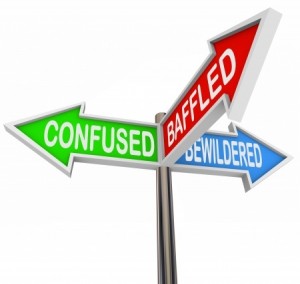
Image credit: iqoncept / 123RF Stock Photo
I keep seeing the same mistakes over and over with misusing words that are similarly spelled or are forms of other words and cause confusion. I’ll try to make it more clear to make it easier to choose the right word.
Accept and Except – accept is to take or receive; except is to exclude.
- She was able to accept the package for Jim. (She was able to RECEIVE the package)
- Everyone was invited except Joe. (Joe was EXCLUDED from the invitation.)
Affect and Effect – affect is to influence or to change; effect is the result or impression or to bring about.
- The habit of coming in late had an affect on Sally’s raise this year. (Sally’s habit of coming in late INFLUENCED her raise.)
- The effect of the rain was a beautiful rainbow and also several accidents on the rush hour drive home. (The beautiful rainbow and the accidents were the RESULT OF the rain.)
Choose and Chose – choose means to select; chose means you have already selected.
- She will choose her car based on its color. (She will MAKE her selection of car based on color.)
- She chose the red car. (She already MADE the selection of the red car.)
Ensure and Insure – ensure means to make certain; insure means to protect against loss.
- He wanted to ensure the job was done correctly. (He wanted to MAKE CERTAIN the job was done correctly.)
- She was able to insure her sports car. (She PROTECTED her sports car.)
Gibe and Jibe – gibe means a sarcastic remark or to scoff at; jibe means to agree.
- The gibe about her hair color was hurtful. (The SARCASTIC REMARK about her hair color was hurtful.)
- The figures didn’t jibe between the checking account and the accounting system. (The figures didn’t AGREE between the checking account and the accounting system.)
Its and It’s – its is the possessive form of it; it’s is the contraction for it is or it has. This is particularly confusing because most possessive forms use the apostrophe, but just remember if you cannot replace your word with “it is,” then you use “its.”
- The dog chewed up its collar. (The collar BELONGED to the dog.)
- It’s the third collar they had to buy the puppy. (IT IS the third collar.)
Know and No – know means to understand; no means not any.
- I now know the correct usage of it’s. (I UNDERSTAND the correct usage of it’s.)
- He has no money to go on vacation. (He does NOT HAVE ANY money to go on vacation.)
Loose and Lose – loose means not bound or to release; lose means to suffer the loss of.
- The dog got loose from its leash and ran out of the yard. (The dog is NOT BOUND by its leash.)
- She was afraid she would lose her dog once it got loose. (Now that the dog is loose, she may SUFFER THE LOSS OF the dog if he does not come home.)
Their and There – their means belonging to them; there means in that place.
- Their house is the nicest on the block. (The house BELONGING TO THEM is the nicest on the block.)
- The car is there in the driveway. (The car is IN THAT PLACE in the driveway.)
Your and You’re – your means that it belongs to you; you’re is the contraction for you are. This one is misused by most of the people I see on Facebook who are teens or preteens and even some young adults and makes me question how they are teaching this in school.
- I thought you said my phone was in your purse? (The purse BELONGS to you.)
- You’re going to the movies tonight, aren’t you? (YOU ARE going to the movies.)
I will have to print this list out for my grandchildren so I don’t get the urge to comment on their Facebook status to change it for them.
I hope the some of the confusion is cleared up. Are there words that are confusing to you? Comment below or email me at [email protected].


 Follow
Follow